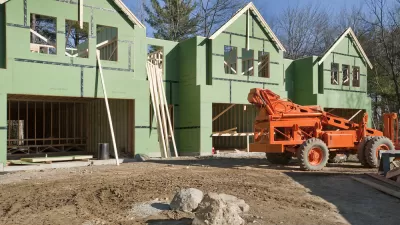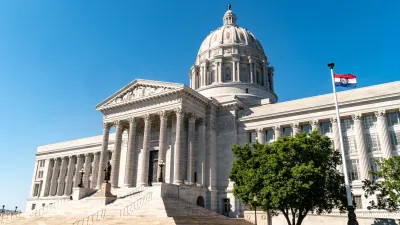While less than a fifth of housing vouchers are utilized nationwide, Wichita has distributed around 70 percent of the vouchers allocated to the city.

In many U.S. cities, federal emergency housing vouchers are "vastly underutilized," with only 15 to 20 percent of vouchers used to lease apartments nationwide. "Challenges, including a tight housing market and skyrocketing rents, have made it difficult for those who receive vouchers to find housing," writes Celia Hack. The city of Wichita, Kansas, meanwhile, has distributed around 70 percent of its 142 vouchers.
Local officials attribute their success to several factors, including the city's existing administrative infrastructure, which had already developed a system of coordination between the Wichita housing authority and housing providers. "When the Wichita Housing Authority received the emergency vouchers in 2021, nonprofits already had infrastructure in place to communicate with the city about who was homeless and in need."
"The emergency housing voucher comes with a deadline — if you don’t find housing within 120 days of receiving it, you lose it. Agencies that worked with clients who received the vouchers said it was a challenge to find landlords who would accept them." To combat this issue, the city also created "an incentive program that provides landlords with support when leasing to tenants who experienced homelessness" to reduce reluctance on the part of private landlords to rent to voucher recipients.
"This success may have been helped by Wichita’s housing market," notes Hack. "Average rent in Wichita is less than half the national average as of October 2021. And according to iProperty Management, Wichita’s rental vacancy rate is 9.7% — about 62% higher than the national vacancy rate."
FULL STORY: The Secret Behind Wichita’s Success With Emergency Housing Vouchers

Maui's Vacation Rental Debate Turns Ugly
Verbal attacks, misinformation campaigns and fistfights plague a high-stakes debate to convert thousands of vacation rentals into long-term housing.

Planetizen Federal Action Tracker
A weekly monitor of how Trump’s orders and actions are impacting planners and planning in America.

In Urban Planning, AI Prompting Could be the New Design Thinking
Creativity has long been key to great urban design. What if we see AI as our new creative partner?

King County Supportive Housing Program Offers Hope for Unhoused Residents
The county is taking a ‘Housing First’ approach that prioritizes getting people into housing, then offering wraparound supportive services.

Researchers Use AI to Get Clearer Picture of US Housing
Analysts are using artificial intelligence to supercharge their research by allowing them to comb through data faster. Though these AI tools can be error prone, they save time and housing researchers are optimistic about the future.

Making Shared Micromobility More Inclusive
Cities and shared mobility system operators can do more to include people with disabilities in planning and operations, per a new report.
Urban Design for Planners 1: Software Tools
This six-course series explores essential urban design concepts using open source software and equips planners with the tools they need to participate fully in the urban design process.
Planning for Universal Design
Learn the tools for implementing Universal Design in planning regulations.
planning NEXT
Appalachian Highlands Housing Partners
Mpact (founded as Rail~Volution)
City of Camden Redevelopment Agency
City of Astoria
City of Portland
City of Laramie





























